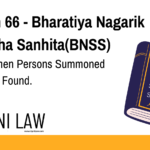Code: Section 64 BNSS
(1) Every summons shall be served by a police officer, or subject to such rules as
the State Government may make in this behalf, by an officer of the Court issuing it or other
public servant:
Provided that the police station or the registrar in the Court shall maintain a register to
enter the address, email address, phone number and such other details as the State
Government may, by rules, provide.
(2) The summons shall, if practicable, be served personally on the person summoned,
by delivering or tendering to him one of the duplicates of the summons:
Provided that summons bearing the image of Court’s seal may also be served by
electronic communication in such form and in such manner, as the State Government may,
by rules, provide.
(3) Every person on whom a summons is so served personally shall, if so required by
the serving officer, sign a receipt therefor on the back of the other duplicate.
Explanation of Section 64 BNSS
Key Provisions
- Who Can Serve a Summons?
- A police officer.
- A Court officer or other public servant, as per State Government rules.
- Methods of Serving a Summons
- Primary Method: Personal delivery to the person summoned.
- Alternative Method: Electronic communication (e.g., email, SMS, or other digital means) if State Government rules permit.
- Record-Keeping for Summons
- A register must be maintained at the police station or Court registrar’s office to record:
- The recipient’s address, email, and phone number.
- A register must be maintained at the police station or Court registrar’s office to record:
- Acknowledgment of Service
- The recipient must sign a receipt if served personally and if the serving officer requires it.
Illustration of Section 64 BNSS
Example 1: Personal Service of Summons
Case: A Court issues a summons to Mr. A for a civil dispute.
✅ A police officer personally delivers the summons to Mr. A.
✅ Mr. A is asked to sign the duplicate copy as acknowledgment.
✅ The officer records the delivery in the police station’s register.
Example 2: Service via Electronic Communication
Case: A company director Mr. B is required to appear in Court.
✅ The Court sends the summons via email with a digital Court seal.
✅ Since State Government rules allow it, this is considered valid service.
Example 3: Failed Attempt to Serve Summons
Case: A police officer visits Mr. C’s house to serve a summons, but Mr. C is not available.
✅ The officer records the attempt in the Court register.
✅ The officer may try alternative methods like electronic communication if allowed by the State Government.
Common Questions and Answers on Section 64 BNSS
1. Who is responsible for serving a summons?
✅ A police officer, Court officer, or public servant as per State Government rules.
2. Can a summons be served via email or WhatsApp?
✅ Yes, if the State Government rules permit it and the summons carries the Court’s digital seal.
3. Is a recipient required to acknowledge the summons?
✅ If personally served, the recipient must sign a receipt if requested by the serving officer.
4. What happens if the person refuses to accept the summons?
✅ The officer can record the refusal and follow alternative methods of service under the BNSS.
5. What details must be recorded when serving a summons?
✅ The police station or Court registrar must maintain a register with:
- Address
- Email address
- Phone number
- Other details as per State Government rules.
Conclusion
Section 64 BNSS ensures effective delivery of summons by:
✅ Allowing multiple serving authorities (police, Court officers, public servants).
✅ Permitting electronic service for faster delivery.
✅ Ensuring accountability through register maintenance.
✅ Providing a legal acknowledgment system for summons recipients.
For more legal updates, visit ApniLaw! 🚀










